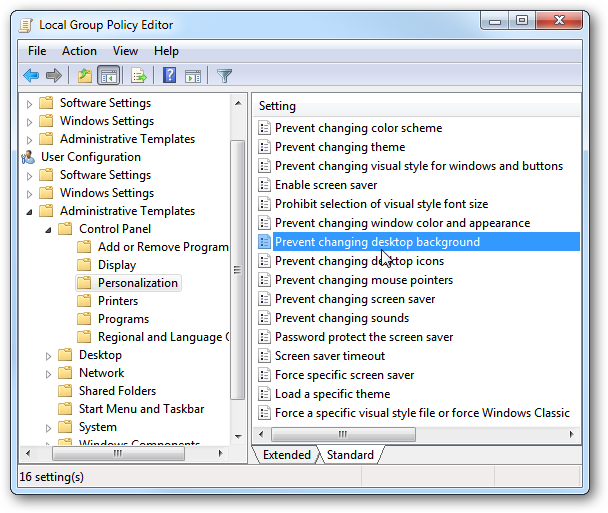Prevent Changing the Screen Saver and Wallpaper in Windows 7
Posted
by Mysticgeek
on How to geek
See other posts from How to geek
or by Mysticgeek
Published on Mon, 10 May 2010 13:00:00 +0000
Indexed on
2010/05/10
13:25 UTC
Read the original article
Hit count: 588
Sometimes you might not want users to have the ability to change Screen Savers and Wallpaper on Windows 7 workstations. Today we look at how to prevent them from changing either one or both.
You might administer computers in your home or small office and find it annoying when users continuously change the wallpaper and Screen Savers to something obnoxious. A lot of times they might be inexperienced users and download these so-called “wonderful and free” Screen Saver/Wallpaper packages from shady sites that include loads of Spyware. Preventing users from changing them is another helpful tool to avoid wasteful time spent switching things back.
Prevent Changing Screensavers & Wallpaper Using Group Policy Editor
Note: This method uses Group Policy which is not available in Home versions on Windows 7.
Open the Start Menu and enter gpedit.msc into the Search box and hit Enter.

When Local Group Policy Editor opens, navigate to User Configuration \ Administrative Templates \ Control Panel \ Personalization. Then in the right column double-click on Prevent changing desktop background.

Now check the radio button next to Enabled, then click OK.

Back on the Group Policy Screen, double-click on Prevent changing screen saver.

In the next screen select the radio button next to Enable, click OK, then close out of Group Policy Editor.

Now when a user goes into the Personalization section, the Desktop Background hyperlink is now grayed out and inactive. Notice the message One or more of the settings on this page has been disabled by the system administrator at the bottom of the section.

If they click to change the Screen Saver, an error message will pop up letting them know the function is disabled.

Prevent Changing Screensavers & Wallpaper Using a Registry Hack
You can also make a couple Registry changes to prevent users from changing the Wallpaper & Screen Saver…which will work on Home versions of Windows 7. Before making any Registry changes make sure you back it up first.
Open the Registry by typing regedit into the Search box in the Start menu and hit Enter.

First we’ll start with the Wallpaper. Navigate to HKEY_CURRENT_USER\Software\Microsoft\Windows\CurrentVersion\Policies\System and create a new String Value and name it Wallpaper.

Then modify the Value data to point to the location of the Wallpaper you want it to always be. Where in this example it’s our main wallpaper on our local drive…then click OK.

Now let’s make sure they can’t change the Screen Saver. In the same Registry location, we need to make a new DWORD (32-bit) Value.

Give it the Value name of NoDispScrSavPage and the value data of “1” and click OK.

Close out of the Registry and restart the machine or simply log off then back on again for the changes to take effect.
Results
For the Wallpapers, a user can still go in and see the selections, however if they try to change it to something else…

It will just go back to the Personalization screen and no changes will be made, as we set the value to only be the background we specified.

If the user tries to make a change to the Screen Saver, the hyperlink will be grayed out and inactive, and the message One or more of the settings on this page has been disabled by the system administrator will be displayed at the bottom of the section.

Conclusion
If you’re tired of users changing the Wallpaper and Screen Saver, and want another way to help avoid Malware, locking down these settings can help a lot. Again, before making any changes to the Registry, make sure to back it up. These settings should work in Vista and XP as well.
| Similar Articles | Productive Geek Tips |
| Latest Software Reviews | Tinyhacker Random Tips |
© How to geek or respective owner
